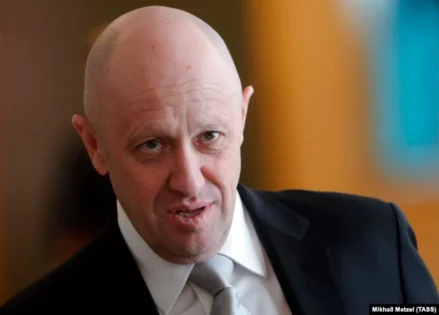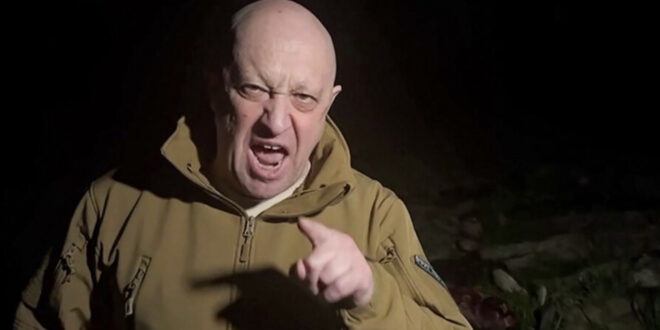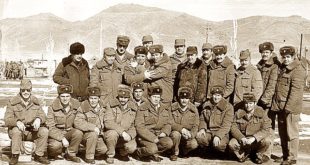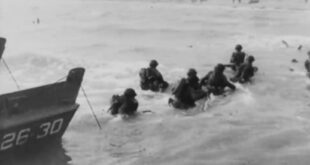by Mike Eckel
Yevgeny Prigozhin, a convict who parlayed a St. Petersburg restaurant business into lucrative Kremlin contracts, founded the private military company Wagner, and became a relentless critic of the Russian military command, made and then stopped a run on Moscow as part of a truncated rebellion. Who is he? Mike Eckel of Radio Free Europe has this report.
Prigozhin was born in 1961 in what was then Leningrad. As a teenager he was caught, and punished, for theft — the first in a series of increasingly more serious crimes, including armed robbery and trafficking in underage minors, that led to him serving just over nine years in prison.
He was released in 1990 at a time when the Soviet Union was in the full throes of Mikhail Gorbachev’s glasnost and perestroika reforms. Along with his mother’s second husband, Prigozhin opened a chain of hot dog stands, which, by his own account, was wildly successful.
READ MORE about Prigozhin’s assault into Russia.
It’s unclear when Prigozhin’s relationship with Putin first developed, though as a budding entrepreneur in St. Petersburg he most likely would have crossed paths with Putin, whose political career started in the city’s mayor office in the 1990s.
Prigozhin later got into the restaurant business; his St. Petersburg eateries were luxurious and frequented by the city’s powerful and elite. He later expanded his food business into catering contracts under a company called Concord Catering — first for schools, hospitals, and prisons, and then for bigger government events.
He also snagged catering contracts for the Kremlin and other Russian elites, earning him the moniker “Putin’s chef.”
In 2006, when U.S. President George W. Bush traveled to St. Petersburg, he and his wife, Laura, were served wine by Prigozhin at a dinner hosted by Putin.
READ MORE: Russian Military Fires On Wagner Forces On Road To Moscow
In 2012, Prigozhin’s companies netted a lucrative contract from a Defense Ministry agency to provide food and catering services for the Russian military. The contract ended a few years later after Sergei Shoigu, an emergency situations minister and longtime Putin loyalist, was appointed defense minister– a fact that may have later fueled Prigozhin’s enmity toward Shoigu.

Mercenaries And Trolls
The exact timing of Prigozhin’s entry into the murky world of private military companies is unclear, but observers point to the onset of the Syria conflict and Russia’s lightning — and ultimately successful — intervention on behalf of the Syrian government.
A spinoff of other private companies that had worked in Syria, Wagner Group appeared sometime around 2014, as Russia stoked and funded an uprising in eastern Ukraine. One man who was a prominent early head of the company was a former military intelligence officer.
Prigozhin was widely assumed to be a funder of Wagner Group for years, but it wasn’t until September 2022, months into Russia’s invasion of Ukraine, that he openly admitted ownership.
In Syria, Wagner fighters have been credibly accused of wartime atrocities, and its fighters have appeared in other countries, as well: Sudan and, more prominently, the Central African Republic, where Prigozhin-linked companies gained lucrative rights to mine gold and other minerals.
In September 2013, Russian journalists began to explore a company that had been founded on St. Petersburg’s northwest outskirts, called the Internet Research Agency, and later dubbed “Russia’s troll factory.” Owned via Prigozhin’s Concord business network, the business hired people to create myriad online profiles, for social media like Facebook, Twitter, and VK, and post inflammatory comments, or set up fake accounts.
In 2018, two years after the U.S. president election that was won by Donald Trump, the U.S. Justice Department indicted Prigozhin and 13 other Russians, and issued an arrest warrant for him, accusing him conspiracy to commit election fraud.
Though researchers have debated how much influence the Internet Research Agency’s trolls had on U.S. voters, the effort was seen as a success for Prigozhin, catapulting him to greater notoriety.
Russian Generals And Sledgehammer Violence
Russian officials and commanders had seemingly assumed that the full-scale invasion of Ukraine, ordered by Putin on February 24, 2022, would result in a rout of Ukraine’s forces, and a quick capitulation by the government in Kyiv.
That didn’t happen, and as the Russian military’s deep-set problems came into clearer view, Prigozhin’s Wagner fighters began taking a more prominent battlefield role. Wagner mercenaries played a key role in the siege of Mariupol, and then the grinding, urban warfare in Syevyerodonetsk, Lysychansk, and Bakhmut.
Prigozhin also turned to recruiting among Russia’s prison inmate population. He became a slashing critic of Russian military commanders, not the least of whom was Shoigu, insulting him and challenging Putin to call a general mobilization. He repeatedly complained that military officials refused to supply his soldiers with adequate ammunition. Prigozhin also embraced violence as an apparent means to enforce discipline or cultivate an image of fear. In the most notorious case in Syria, Wagner soldiers were shown torturing and mutilating a captured man, including using a sledgehammer to bludgeon him.
The sledgehammer became a grotesque symbol for Prigozhin. In November 2022, a video appeared on a Telegram channel linked with Wagner. In it, a Russian soldier who allegedly defected to Ukraine but was recaptured by Russia was shown being killed with a sledgehammer. Prigozhin later endorsed the act.
His opprobrium was all the more noteworthy given that lawmakers had criminalized the public criticism of Russia’s armed forces, shortly after the launch of the invasion. The law, meanwhile, has been used to put scores of Russians who have protested the war in jail.

But while Wagner troops were seen, in some cases, as more effective and more efficient than regular Russian troops, the group’s fighters suffered exceptional casualty rates, particularly around the Donetsk city of Bakhmut. Western officials cited relentless infantry waves of soldiers — many of whom were former prison inmates hired by Wagner — being thrown at Ukrainian positions.
On May 20, after nearly 10 months besieging Bakhmut, Russian forces claimed victory over the city. Putin acknowledged Wagner soldiers’ role in the fight, though not by name, and without mentioning Prigozhin.
For his part, Prigozhin used the opportunity to rip into Russia’s military leadership. In an interview with pro-Kremlin TV personality Konstantin Dolgov, he mocked not only Shoigu but his children, as well. He also suggested the Ukraine war had failed, called for marital law to imposed, and warned of the dangers of a coup, not unlike the 1917 Bolshevik uprising to overthrow the Russian tsar.
“The children of the elite shut their traps at best, and some allow themselves a public, fat, carefree life,” Prigozhin said. “This division might end as in 1917, with a revolution — when first the soldiers rise up, and then their loved ones follow.”
In a speech given hours after armed Wagner forces took up positions in the southern city of Rostov-on-Don and moved north on a major highway toward Moscow, Putin himself invoked 1917 in a clear indication that Prigozhin’s mutiny was turning into the greatest challenge Putin has faced in his 23 years as Russia’s preeminent leader.
Mike Eckel is a senior correspondent for RFE/RL reporting on Russia, Ukraine, and around the former Soviet Union, plus cybercrime and espionage. He’s reported on the ground on Russia’s invasion of Ukraine, the wars in Chechnya and Georgia, and the 2004 Beslan hostage crisis, as well as the annexation of Crimea in 2014. Find him on Twitter, [email protected].
 Soldier of Fortune Magazine The Journal of Professional Adventurers
Soldier of Fortune Magazine The Journal of Professional Adventurers






